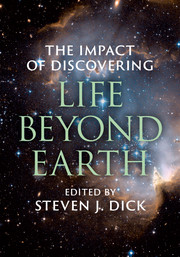Book contents
- Frontmatter
- Dedication
- Contents
- List of contributors
- Introduction: Astrobiology and society
- Part I Motivations and approaches: How do we frame the problems of discovery and impact?
- Part II Transcending anthropocentrism: How do we move beyond our own preconceptions of life, intelligence, and culture?
- Part III Philosophical, theological, and moral impact: How do we comprehend the cultural challenges raised by discovery?
- 10 Life, intelligence, and the pursuit of value in cosmic evolution
- 11 “Klaatu Barada Nikto” – or, do they really think like us?
- 12 Alien minds
- 13 The moral subject of astrobiology: Guideposts for exploring our ethical and political responsibilities towards extraterrestrial life
- 14 Astrobiology and theology
- 15 Would you baptize an extraterrestrial?
- Part IV Practical considerations: how should society prepare for discovery – and non-discovery?
- Contributor biographies
- Index
- References
15 - Would you baptize an extraterrestrial?
from Part III - Philosophical, theological, and moral impact: How do we comprehend the cultural challenges raised by discovery?
Published online by Cambridge University Press: 05 November 2015
- Frontmatter
- Dedication
- Contents
- List of contributors
- Introduction: Astrobiology and society
- Part I Motivations and approaches: How do we frame the problems of discovery and impact?
- Part II Transcending anthropocentrism: How do we move beyond our own preconceptions of life, intelligence, and culture?
- Part III Philosophical, theological, and moral impact: How do we comprehend the cultural challenges raised by discovery?
- 10 Life, intelligence, and the pursuit of value in cosmic evolution
- 11 “Klaatu Barada Nikto” – or, do they really think like us?
- 12 Alien minds
- 13 The moral subject of astrobiology: Guideposts for exploring our ethical and political responsibilities towards extraterrestrial life
- 14 Astrobiology and theology
- 15 Would you baptize an extraterrestrial?
- Part IV Practical considerations: how should society prepare for discovery – and non-discovery?
- Contributor biographies
- Index
- References
Summary
In September, 2010, I had traveled to Birmingham, England, to give an astronomy talk at the Birmingham Science Festival. As it turned out, the day of my talk happened to coincide exactly with the visit of Pope Benedict XVI to Birmingham. I had agreed to be interviewed by the British press to publicize the festival, yet – understandably – all they wanted to ask me about was the Pope. But they kept asking me questions like, “What is your biggest source of conflict about the Pope?” Or, “Has the Pope ever tried to suppress your scientific work?” To my mind, these sorts of questions were bizarre; the mere existence of a Vatican Observatory ought to have shown them that their fundamental assumption about a hostility between the papacy and science was mistaken. Worse, the reporters seemed to be not at all interested in correcting that assumption, or hearing my description of the active support we had received not only from the Vatican in general over more than one hundred years, but more specifically from Pope Benedict himself. Finally, frustrated that they weren't getting the story they wanted out of me, one of them asked, “Would you baptize an extraterrestrial?”
My answer, off the top of my head, was, “Only if they ask!” It got a good laugh, which is what I wanted. And then, the next day, the press ran my joke as if it were a real story – as if I had made some sort of official Vatican pronouncement about aliens (Jha 2010). And that was merely the reaction of the relatively mainstream media. The more exotic wings of the internet were immediately full of wild interpretations, ranging from the thought that the Vatican was preparing the world for an imminent alien contact, to worries that somehow Jesus himself was an alien.
Of course, if these people had read their own newspapers, they could have found plenty of articles repeating this theme, over and over. For example, in 2008 the Vatican Observatory director, Fr. José Funes, SJ, had made essentially the same point in an article in L'Osservatore Romano and his comments had been widely reported.
- Type
- Chapter
- Information
- The Impact of Discovering Life beyond Earth , pp. 233 - 244Publisher: Cambridge University PressPrint publication year: 2015
References
- 3
- Cited by



